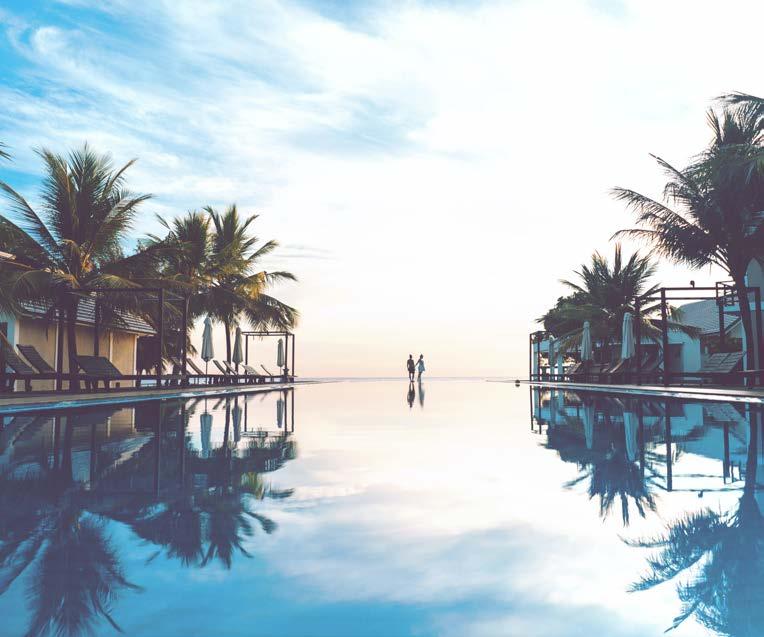
5 minute read
LOCAL TRENDS
Four reasons why local weekend getaways are taking off.
The quiet winter months for owners of independent hotels, B&B’s and guesthouses are fastapproaching and the Covid-19 pandemic has made things difficult for the hospitality industry. Without international visitors – as a result of the lockdown – the survival of many businesses is going to rest on the support of South Africans.
Advertisement
According to RoomRaccoon, a tech start-up that provides hotel management software to the hospitality industry, there has been a surge in weekend tourism with occupancy numbers edging towards 60 per cent through November and December 2020. Most recently, the Valentine’s and Easter weekends saw occupancy spike to 58 per cent.
Niels Verspui, country manager of RoomRaccoon offers some insights into the local weekend getaways.
Domestic weekend travel has begun to show signs of revival since the lockdown restrictions were dropped to level two in August of last year. Local tourists are taking advantage of heavily discounted getaways, as indicated by global tech start-up, RoomRaccoon, with weekend occupancy numbers on the rise.
Last year’s Tourism Industry Survey1 painted a grim picture at a time when many were hoping for international tourism to resume by the end of the 2020. But, by November, foreign traveller numbers arriving in South Africa were far less than those visiting the country in 2019. After an economically quiet 2020 festive season, the challenge for hotels, guest houses and B&B’s to remain viable through 2021 and until international tourism resumes, will rest on the support of South African locals.
Earlier this year, RoomRaccoon, monitored occupancy of more than 3,200 rooms at boutique hotels, B&B’s and guesthouses across South Africa. The company reports that since the lockdown restrictions were initially eased to level 2 mid-August last year, weekday occupancy has steadily risen to an average of 30 per cent. However, it is weekend occupancy that has shown a surge at these establishments, with numbers edging towards 60 per cent through November and December 2020. The recent Valentine’s weekend saw occupancy spike to 58 per cent.
According to RoomRaccoon, establishments in the coastal areas including Cape Town’s Atlantic Seaboard, as well as the Stellenbosch winelands and Franschhoek regions, the Garden Route, and the Drakensberg, have seen the highest occupancies.
“The uptick in weekend tourism may represent a feint silver-lining, but the industry still needs to be agile, with initiatives to maintain guest traffic over the coming winter months, and until international visitors are able to safely return,” Mr Verspui said.
It is critical for the industry to prepare for the traditionally slower months of May, June and July.
“Our data indicates that people have maintained an appetite for travel despite the lockdown. With many places offering competitive prices to locals, weekend getaways are how they are choosing to indulge. Hotels, guest houses, B&B’s and lodges will be relying heavily on local support to make it through the leaner months, which is why the spike in weekend occupancy is noteworthy, and we are confident that more establishments will cater for this,” Mr Verspui said.

According to Mr Verspui, there are four reasons why the local weekend getaway trend is taking off:
1. Affordability
The Department of Tourism’s Quarterly Performance Report2 for the period April to June 2020 indicated that the arrival of foreign travellers was down 96.2 per cent compared to the same period in 2019. With barely 142,000 foreign arrivals versus the 3.7 million international visitors for the previous year, the knock-on effect was a 96.9 per cent revenue decline for the South African accommodation industry. To offset the losses, establishments subsequently introduced discounted rates to make themselves more accessible to the local market who may now enjoy time at places they previously could not afford.
2. Uniquely packaged experiences
The properties that have been doing well are the ones that packaged and promoted unique experiences. Over and above accommodation, they have added value by offering welcome drinks, including a romantic meal or picnic, adding tours and tastings, cultural experiences, or guided nature walks. South Africans are looking for escapes and hideaways, and opportunities to experience something unique and affordable.
3. Enhanced confidence in Covid compliance
Minimising contact with property staff, establishing social distancing and hygiene protocols, and limiting the need to share facilities with other patrons provides guests with more control over their personal safety and has been critical in seeing the increase in local weekend tourism. The Contactless Stay initiative provides added confidence that guests will remain protected. Contactless Stay allows guests to check-in and make payments online, choose a contactless key system for added safety, and allow guests to book essentials and extras – like Corona kits - in advance. On request, house-keeping services may also be excluded for the duration of a stay.
4. Technology
Like most industries, the accommodation sector has, similarly, turned to technology during the lockdown to create operational efficiencies. Using technology to enhance the guest experience by making the online booking process more streamlined and direct also means that establishments may reduce booking engine fees. Hotel management systems designed for boutique and medium-sized properties are becoming popular, allowing them to benefit in ways that have previously only been available to the larger hotel groups. Affordable, accessible technology provides visibility of what competitors are doing in terms of pricing, so they may quickly apply rate changes to cater for fluctuations in supply and demand using automated yield management software.
In conclusion, tech is making small and medium-sized businesses more competitive and agile during a highly challenging period, where they need to remain visible and appealing to the market, but it also gives them the edge to price themselves accordingly.
1. https://www.tourism.gov.za/CurrentProjects/ Tourism_Relief_Fund_for_SMMEs/ Documents/South%20Africa%20Tourism%20 Survey%202%20on%20COVID-9%20 (June%202020)%20Results.pdf
2. https://www.tourism.gov.za/AboutNDT/ Publications/Q2%20Tourism%20 Performance%20Report%20-%20April- June%202020.pdf
Who is Niels Verspui?

Niels Verspui is the country manager for RoomRaccoon South Africa. His understanding of the hospitality industry challenges is boosted by his experience working at hotels and guest houses, both locally and in the Netherlands. During his internship for a bachelor’s degree – which researched the customer journey – he recognised the need for more innovative, automated hotel and hospitality systems to reduce manual work and deliver cost-savings to businesses. He introduced RoomRaccoon to the South African market in November 2017.










